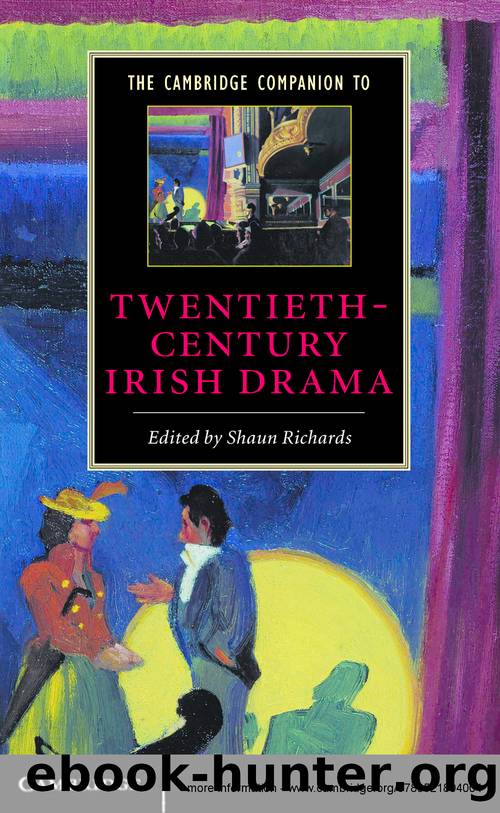The Cambridge Companion to Twentieth-Century Irish Drama by Unknown

Author:Unknown
Language: eng
Format: epub
Publisher: Cambridge University Press
Published: 2004-07-14T16:00:00+00:00
His new knowledge of his cowardice is all too easily assimilated into his practised linguistic rituals; the pretence of brave confrontation, filtered through poetry and melodrama, ironically protects his calloused sensibility. By this point in the play his bogus poetry and affected despondency ring false, as does his repetition of morose Shelleyan fragments – ‘Ah me, alas! Pain, pain, pain ever, for ever!’ Even as he strives for melodramatic import, his high-flown rhetoric indicates that he is hiding behind his pessimism, rather than confronting his pretentious vanity and culpable passivity. In a curious imbrication of the two dominant yet ostensibly opposing themes, Davoren’s disillusionment is itself cast as a form of comforting delusion. The recognition of guilt, couched in this overrich idiom, becomes a mockery of itself. Davoren replaces bogus and pseudo-poetic self-delusion with bogus and pseudo-poetic self-knowledge.
O’Casey’s move from active militarism and politics into a more rarefied poetic realm is underwritten by doubt and feelings of impotence at his passivity and bitter disenchantment with the course of Irish politics. Donal Davoren, poetic, pretentious and passive, is a sublimated expression of this guilt and frustration. The Shadow of a Gunman, though it lacks the breadth and ambition of the later two Trilogy plays, is unique in its self-doubt and embitterment. Moreover, the efforts to transmute harsh disappointment and disillusionment into a meaningful and moral exposure of delusion – the governing motive of the Trilogy – is here most strongly encoded in the action. Ironically the relative inexperience with which O’Casey wrote The Shadow of a Gunman is, in one sense, its strength. Juno and the Paycock and The Plough and the Stars are more accomplished in the concealment of the suppressed motivations behind their construction, smoothed over by a more finessed realist coherence.
Set during the Civil War, Juno and the Paycock deals in broken dreams. The narrative uses a stock melodramatic plot – fortune supposedly inherited, then lost – as a mockingly blunt allegory for the disappointments of Irish national independence. The conventional interpretation of the play elevates Juno as the humanist heroine, who keeps house and home together despite the drunken irresponsibility of her feckless husband. Again, there is much in the play which queries Juno’s opposition between hearts of stone and hearts of flesh, or at least undermines her status as the play’s pragmatic heroine. The verbosity and imagination of the two men, though parasitic and culpably irresponsible, is often more attractive than Juno’s dour conformity.8 We know that it is Juno who keeps the family together, and we admire her for her fortitude and compassion, particularly at the end of the play. Poverty means she can afford the luxury of neither imagination nor politics. However, despite his irresponsibility, the Captain’s shenanigans sparkle long after the curtain has dropped. We also witness his selfish, vainglorious bluster and his hopelessly weak, inadequate and immoral rejection of Mary at the end of the play, yet the ambivalence is an antidote to the polemicism into which O’Casey occasionally slides. Juno shifts
Download
This site does not store any files on its server. We only index and link to content provided by other sites. Please contact the content providers to delete copyright contents if any and email us, we'll remove relevant links or contents immediately.
Call Me by Your Name by André Aciman(20501)
Ready Player One by Cline Ernest(14645)
How to Be a Bawse: A Guide to Conquering Life by Lilly Singh(7472)
Wiseguy by Nicholas Pileggi(5771)
The Kite Runner by Khaled Hosseini(5170)
On Writing A Memoir of the Craft by Stephen King(4936)
Audition by Ryu Murakami(4924)
The Crown by Robert Lacey(4808)
Call me by your name by Andre Aciman(4676)
Gerald's Game by Stephen King(4642)
Harry Potter and the Cursed Child: The Journey by Harry Potter Theatrical Productions(4503)
Dialogue by Robert McKee(4389)
The Perils of Being Moderately Famous by Soha Ali Khan(4217)
Dynamic Alignment Through Imagery by Eric Franklin(4208)
Apollo 8 by Jeffrey Kluger(3705)
The Inner Game of Tennis by W. Timothy Gallwey(3682)
Seriously... I'm Kidding by Ellen DeGeneres(3629)
How to be Champion: My Autobiography by Sarah Millican(3591)
Darker by E L James(3512)
